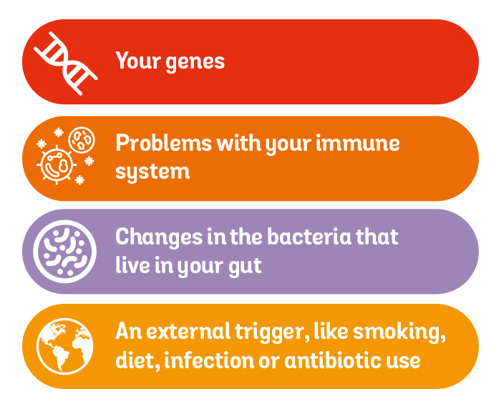Discover natural remedies to ease Crohn’s flares without medication. Explore holistic approaches for managing symptoms and improving digestive health.
Table of Contents
Introduction to Crohn’s Disease
In this section, we will explore the basics of Crohn’s disease, focusing on its impact on gut health and the importance of reducing inflammation in managing the condition.
What is Crohn’s Disease?
Crohn’s disease is a chronic inflammatory condition that primarily affects the gastrointestinal tract, causing inflammation and damage to the lining of the intestines. This can result in various symptoms such as abdominal pain, diarrhea, fatigue, and weight loss. It is essential to understand what Crohn’s disease is to effectively manage its symptoms and improve overall well-being.
The Importance of Gut Health
Gut health plays a crucial role in our overall well-being as it affects digestion, nutrient absorption, and the immune system. When someone has Crohn’s disease, the inflammation in the intestines can disrupt the balance of gut bacteria and lead to further complications. Maintaining gut health is vital for managing symptoms and improving quality of life for individuals with Crohn’s disease.
Why Reduce Inflammation?
Inflammation is the body’s natural response to injury or infection, but in the case of Crohn’s disease, chronic inflammation in the intestines can worsen symptoms and lead to flare-ups. By reducing inflammation through various methods, individuals with Crohn’s disease can experience fewer discomforts and better manage their condition.
Understanding Crohn’s Flares
Crohn’s disease is a chronic condition that can cause inflammation in the digestive tract, leading to discomfort and other symptoms. When someone with Crohn’s experiences a worsening of their symptoms, it is known as a Crohn’s flare.
What are Crohn’s Flares?
A Crohn’s flare refers to a sudden increase in the severity of symptoms associated with the disease. These symptoms may include abdominal pain, cramping, diarrhea, fatigue, and sometimes even fever. During a flare-up, the inflammation in the intestines worsens, leading to more significant discomfort and disruption to daily life.
It’s crucial to understand what triggers these flares and how to manage them effectively to minimize discomfort and maintain overall health.
The Role of Diet in Managing Crohn’s
When it comes to managing Crohn’s disease, making changes to your diet can play a significant role in reducing symptoms and improving gut health. By being mindful of what you eat, you can potentially minimize inflammation in the body and help alleviate discomfort associated with the condition.

Image courtesy of cdhf.ca via Google Images
Foods to Enjoy
Opting for foods that are gentle on the stomach and promote gut health can be beneficial for individuals with Crohn’s disease. Some examples of foods to enjoy include:
- Probiotic-rich foods like yogurt and kefir that can support a healthy balance of gut bacteria.
- High-fiber fruits and vegetables that provide essential nutrients without causing digestive issues.
- Lean proteins such as chicken, fish, and tofu that are easier to digest.
- Whole grains like brown rice and quinoa that offer sustained energy and fiber.
Foods to Avoid or Limit
On the flip side, there are certain foods that may trigger symptoms or exacerbate inflammation in individuals with Crohn’s disease. It’s essential to be mindful of the following foods and consider limiting or avoiding them:
- Processed foods high in sugar and unhealthy fats that can lead to inflammation.
- Spicy foods that may irritate the digestive system and trigger flare-ups.
- Dairy products for those who are lactose intolerant or find dairy aggravates their symptoms.
- Fried or fatty foods that can be harder to digest and may worsen gastrointestinal issues.
By paying attention to the foods you consume and making informed choices, you can positively impact your gut health and potentially reduce the frequency and severity of Crohn’s flares.
Home Remedies That Can Help
When it comes to managing Crohn’s disease naturally, some herbs and supplements have shown promise in reducing inflammation and easing symptoms. Turmeric, for example, is known for its anti-inflammatory properties and may help alleviate discomfort associated with Crohn’s flares. Additionally, probiotics containing beneficial bacteria can promote gut health and support a balanced microbiome, which is crucial for managing symptoms.
Stress-Reduction Techniques
Reducing stress is essential for overall well-being and can have a positive impact on Crohn’s disease. Stress can trigger flares and worsen symptoms, so implementing stress-reduction techniques like deep breathing exercises, yoga, or mindfulness meditation can help manage the condition. Finding ways to de-stress and relax your mind can potentially lead to fewer flare-ups and improved symptom control.
The Benefits of Regular Exercise
Regular exercise plays a significant role in managing Crohn’s disease symptoms and promoting overall health. By incorporating physical activity into your routine, you can potentially experience relief from discomfort and improve your well-being.

Image courtesy of www.pinterest.com via Google Images
Safe Exercises for Crohn’s
When dealing with Crohn’s disease, it’s essential to choose exercises that are gentle on your body but still beneficial. Low-impact activities like walking, swimming, yoga, and Tai Chi are excellent choices. These exercises can help strengthen your body, improve flexibility, and reduce stress without putting too much strain on your digestive system.
| Method | Description |
|---|---|
| Dietary Changes | Adopting a low-fiber diet, avoiding trigger foods, and staying hydrated can help ease Crohn’s flares. |
| Stress Management | Practicing relaxation techniques such as yoga, meditation, and deep breathing can reduce stress and potentially prevent flares. |
| Regular Exercise | Maintaining a consistent exercise routine can help manage symptoms and promote overall well-being. |
| Supplements | Consulting with a healthcare provider about incorporating probiotics, omega-3 fatty acids, and other supplements may help alleviate symptoms. |
| Sleep | Prioritizing rest and maintaining a regular sleep schedule can support the body’s natural healing process and reduce inflammation. |
| Medication | In some cases, prescription medications may be necessary to manage Crohn’s disease symptoms and prevent flares. |
The Importance of Sleep
Sleep is essential for everyone, including those with Crohn’s disease. It plays a crucial role in managing symptoms and promoting overall health. Let’s explore why good sleep is beneficial for those coping with Crohn’s disease.
Sleep Tips for Better Rest
Here are some simple tips to help you get better sleep and manage your Crohn’s symptoms effectively:
1. Stick to a bedtime routine: Going to bed and waking up at the same time every day helps regulate your body’s internal clock, making it easier to fall asleep and wake up feeling refreshed.
2. Create a relaxing environment: Make your bedroom a comfortable and peaceful space that promotes restful sleep. Keep the room cool, dark, and quiet to encourage relaxation.
3. Limit screen time before bed: The blue light emitted by electronic devices can interfere with your body’s production of melatonin, a hormone that regulates sleep. Try to avoid screens at least an hour before bedtime.
4. Practice relaxation techniques: Engaging in activities like deep breathing, meditation, or gentle yoga before bed can help calm your mind and prepare your body for sleep.
5. Avoid caffeine and heavy meals close to bedtime: Consuming stimulants like caffeine and large meals too close to bedtime can disrupt your sleep. Opt for light, easy-to-digest snacks if you’re hungry before bed.
By prioritizing good sleep hygiene and following these tips, you can improve your sleep quality and better manage your Crohn’s disease symptoms.
Stay Hydrated
Hydration is super important for keeping our bodies healthy, especially if you have Crohn’s disease. Staying hydrated means making sure you drink enough water throughout the day. Let’s find out why this is crucial!

Image courtesy of www.pinterest.com via Google Images
Benefits of Drinking Water
Water is like a superhero for our bodies, especially for someone dealing with Crohn’s disease. It helps in so many ways, like:
- Keeping your gut happy: Drinking water helps in maintaining the balance in your gut and can prevent issues that might trigger flare-ups.
- Flushes out toxins: Water helps your body get rid of toxins that could cause inflammation and discomfort.
- Improves digestion: Hydration assists in breaking down food and absorbing nutrients better, which is important if you have Crohn’s.
So, remember to drink water throughout the day to keep your gut healthy and manage your Crohn’s symptoms better!
The Impact of Stress on Crohn’s Disease
Inflammation Reduction and Symptom Management
Understanding Stress and Inflammation
Stress is a natural response in our bodies when we face challenges or feel overwhelmed. For individuals with Crohn’s disease, stress can play a significant role in triggering symptom flares. When we are stressed, our bodies release certain chemicals that can increase inflammation in the intestines, leading to discomfort and potential flare-ups of the disease.
Working with Healthcare Professionals
When it comes to managing Crohn’s disease, working hand in hand with healthcare professionals is crucial for effective treatment and symptom management. Here’s why collaborating with doctors and specialists is so important.

Image courtesy of crohnsandcolitis.org.uk via Google Images
Creating a Treatment Plan
Healthcare professionals, including gastroenterologists and dietitians, can help you create a personalized treatment plan tailored to your specific needs. They will take into consideration your symptoms, medical history, and lifestyle to come up with the most effective strategies for managing Crohn’s disease.
Through regular consultations and check-ins with your healthcare team, you can monitor your progress, address any concerns or changes in symptoms, and adjust your treatment plan accordingly. This ongoing collaboration ensures that you receive the support and guidance needed to effectively manage your condition.
Conclusion
In conclusion, managing Crohn’s disease naturally is possible through various methods that aim to reduce inflammation, support gut health, and alleviate symptoms. By making dietary changes, implementing stress-reduction techniques, incorporating regular exercise, prioritizing sleep, staying hydrated, and working with healthcare professionals, individuals with Crohn’s can take proactive steps towards easing flares and improving their overall quality of life.
Remember, every person’s experience with Crohn’s disease is unique, so it is essential to work closely with healthcare providers to create a personalized treatment plan that best suits individual needs. By staying informed, making lifestyle adjustments, and seeking professional guidance, managing Crohn’s can become more manageable and less disruptive to daily life.
FAQs
Can diet alone control Crohn’s flares?
Diet plays a significant role in managing Crohn’s disease symptoms. While eating a healthy diet rich in fruits, vegetables, whole grains, and lean proteins can help reduce inflammation and support gut health, it may not be sufficient to control flares on its own. It is essential to work with healthcare providers to create a comprehensive treatment plan that may include dietary changes, medications, and other therapies tailored to your specific needs.
Are natural remedies safe for everyone with Crohn’s?
Natural remedies, such as herbs and supplements, may offer potential benefits for reducing inflammation and managing Crohn’s symptoms. However, it is crucial to consult with your healthcare provider before trying any new remedies, as not all treatments are suitable for everyone. Some herbs and supplements may interact with medications or exacerbate certain symptoms, so professional guidance is essential to ensure safe and effective use.





